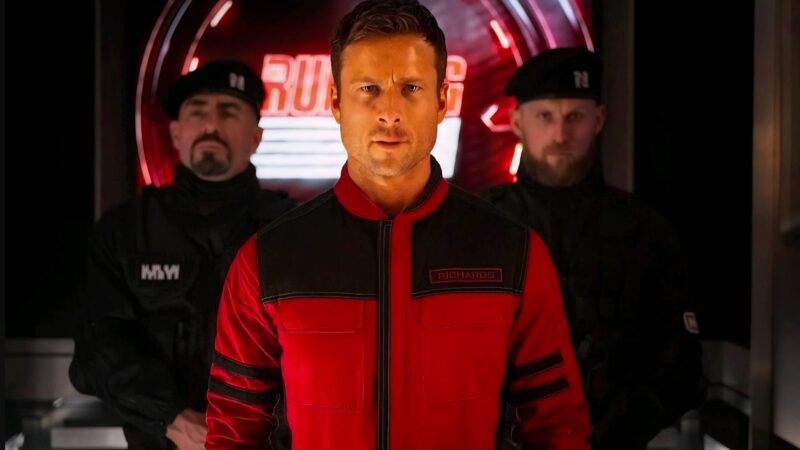The Running Man Is a Shallow, Socialist Action Fantasy
A dystopian action cartoon for the Bernie bro set.

The biggest twist in The Running Man comes when the credits roll: The screenplay is credited to director Edgar Wright and Michael Bacall. I was shocked. No Zohran Mamdani? Even without his name, the movie plays like a hodgepodge of the incoming New York City mayor's socialist themes.
When we first meet our hero, Ben Richards (Glen Powell), he's begging for work after being blacklisted for union activity. As he watches a junky game show on television with his infant daughter, he trashes the rich for being "full of shit." Since he can't work, he tries out for one of those game shows himself, because it's the only way he can get money to purchase medicine for his sick child. During the tryouts, he's subjected to a battery of physical and psychological tests, including a word association game. When confronted with the word "freedom," he snarls back: "Nope!" At the Washington, D.C., theater where I saw the movie, this got a big laugh.
Like the 1987 Arnold Schwarzenegger film of the same name, The Running Man is an adaptation of the Stephen King novel, set in a dystopian corporatist future where the public is placated by brain rot television. Richards becomes a contestant on a game show in which ordinary people are set loose across America and hunted by a team of elite killers. As the game plays out, the viewing public is rewarded for tips that lead to a kill. The game's host, Bobby T (an electric Colman Domingo), portrays the contestants as foul, anti-American, and angry; Richards' union activity is reframed as a conspiracy to share corporate secrets with Communists. And then the question becomes whether the public will side with the runner or the hunters, and how long the runner, whose winnings increase by the day, will survive.
But unlike the 1980s version, which was essentially a big-man action romp in the era's usual style, Wright's adaptation channels King's left-wing politics with far more vigor. And though it was written and produced before Mamdani's unlikely rise, it shares the same dismal, angry economic worldview, in which wealthy people and corporate overlords manipulate a cruel and uncaring system for personal gain while exploiting workers at the bottom. I was almost surprised when there wasn't a lecture on affordability.
Instead, we get a cacophony of cartoon-like action sequences in Wright's signature zippy style. As in films like Hot Fuzz, Baby Driver, and Scott Pilgrim vs. the World, Wright renders the world as a sort of bubblegum colored fantasia, a live-action Looney Tunes in which everything bounces along according to a spastic comic rhythm.
No one ever talks like a real human being. Instead, they spit out zingers and theme-y declarations as if writing blurb copy for the movie, or preparing, like characters in a musical, to break out in song. The Running Man isn't a musical, but with its focus on hyper expressive faces, choreography gags, and exaggerated sentiment, it sometimes feels like one. Indeed, it's only when the soundtrack kicks in and the action choreography dances along that the movie really comes to life.
As an action fantasy, it's a stylish enough showcase for Wright's visual flair and sardonic sensibility. The camera floats through the frames, often mimicking the point of view of the robot cameras that follow the game show action. The nimbly edited action sequences turn on musical cues. From time to time, it's funny and fun.
But Wright is so devoted to his cartoon-musical style that he can't muster much of an emotional connection. Like the fictional game show itself, Richards' familial stakes come across as concocted to manipulate viewers rather than present a meaningful human drama. There's just not much to hold onto, no heart-tugging anchor for the movie's angry politics.
Meanwhile, those politics are fairly muddled: The single all-powerful network that runs the game show and the economy (and also turns out to be poisoning children) functions more like an authoritarian state than a wielder of private corporate power in a competitive market. Top-down social and economic control in which an all-powerful authority deploys gun-toting, uniformed enforcers to deprive people of freedom, individuality, and the right to earn a living? Turns out socialists don't like that much either.


Show Comments (18)